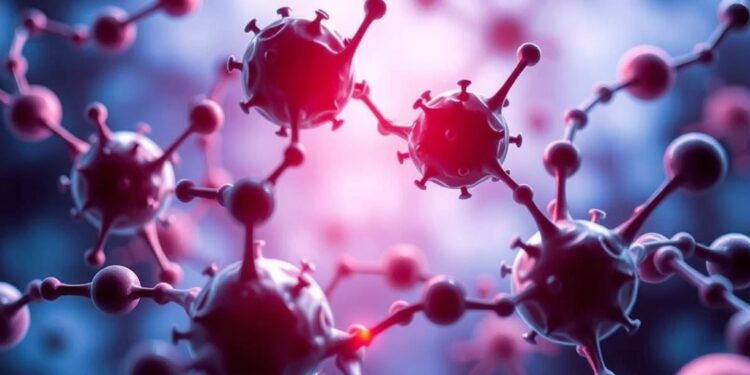Recent advancements in cancer research have illuminated a complex metabolic interaction between breast cancer cells and immune cells, a dynamic that significantly impacts tumor aggressiveness and resistance to treatments. A pioneering study conducted by a team of Chinese scientists, led by Prof. Hu Hai, reveals how breast cancer cells manipulate the amino acid arginine to enhance their growth while simultaneously evading the immune response. The implications of this research could reshape therapeutic strategies in oncology, particularly in the context of immunotherapy.
In this groundbreaking study published in Cancer Cell on April 3, 2025, the researchers employed advanced techniques to analyze the tumor microenvironment. The team unveiled that breast cancer cells act like "arginine factories," which saturate their surroundings with this essential amino acid. Arginine plays a crucial role not only in tumor proliferation but also in modulating the immune response. This dual utility makes it a pivotal player in the interaction between cancer cells and immune cells, particularly tumor-associated macrophages (TAMs).
The researchers meticulously examined how the excess arginine produced by cancer cells reprograms nearby tumor-associated macrophages, key players in the immune system. When exposed to high levels of arginine, TAMs undergo a transformation that binds them to a pro-tumor state, impairing their ability to activate CD8+ T cells. CD8+ T cells are known as the body’s primary line of defense against cancerous cells, and their suppression heralds a troubling progression for patients battling breast cancer.
By utilizing cutting-edge single-cell and metabolic analyses, the team traced the fate of arginine once it enters the tumor microenvironment. They discovered that TAMs absorb arginine and metabolize it into polyamines—organic compounds that have significant roles in cell proliferation and signaling. This metabolic shift induces changes in the genetic programming of macrophages, locking them into a state that inhibits their anti-tumor functions, thereby promoting not just survival but the aggressive growth of the tumor itself.
The findings underscore a disturbing aspect of cancer biology: the ability of cancer cells to co-opt the immune system’s components to support their growth. The generated polyamines enhance the immunosuppressive environment, carving a path for the tumor to thrive while thwarting the body’s natural defenses. This revelation paves the way for novel therapeutic interventions aimed at disrupting this metabolic interplay.
Significantly, the research team demonstrated that targeting arginine metabolism could restore the functionality of CD8+ T cells. In preclinical models, the manipulation of arginine levels led to a noticeable slowing of tumor growth, showcasing a potential avenue for more effective treatments. By decoupling the supply of arginine to tumors, it may be possible not only to starve them but also to reinvigorate the immune system’s capacity to fight cancer.
The potential clinical applications of these findings are tantalizing. The researchers propose a strategy that combines traditional immunotherapies with agents that target arginine metabolism or polyamine synthesis. This dual approach could disrupt the cycle of immune suppression, making it more difficult for tumors to evade the immune system, thereby improving outcomes for patients.
While the study primarily focuses on breast cancer, the implications of the metabolic mechanisms identified could extend to other types of malignancies. Tumors in various tissues may exploit similar mechanisms to evade immune surveillance, thereby indicating a broader metabolic crosstalk at play in cancer biology. This comprehensive understanding is essential for the development of precision therapies tailored to the metabolic needs of different tumor types.
The intersection of cancer biology and immunology represented by this research could mark a paradigm shift in cancer treatment. It highlights the importance of considering metabolic relationships within the tumor microenvironment when designing therapeutic regimens. The dual strategy of starving tumors while concurrently empowering the immune response could redefine how we approach cancer treatment, ushering in a new era of more effective, targeted therapies.
Moreover, the necessity of comprehensive research into metabolic pathways in cancer is underscored by these findings. As researchers bolster their understanding of these intricate interactions, there lies the potential for the emergence of breakthrough therapies that convert the vulnerabilities of cancer cells against them. The prospect of developing drugs specifically aimed at disrupting these metabolic cycles could serve as game-changers in oncology.
In conclusion, the discovery of the interplay between arginine metabolism and immune suppression represents a significant advancement in our understanding of cancer biology. As the battle against cancer continues, studies like this one provide hope that by deciphering the intricacies of tumor metabolism and immune evasion, we can devise innovative strategies to conquer this formidable foe.
The journey toward personalized cancer therapy is still unfolding, with studies like this paving the way for future innovations. For patients and their families, understanding how cancer exploits metabolic mechanisms offers not just insights into the disease process but also hope for more effective treatment options on the horizon.
This research is a clarion call for the scientific community to invest in further studies that could unlock the mysteries of cancer metabolism and immune interaction, ultimately leading to breakthroughs that could save countless lives in the ongoing fight against cancer.
Subject of Research: The metabolic interaction between breast cancer cells and immune cells, focusing on arginine’s role in tumor progression and immune evasion.
Article Title: Cancer cell-derived arginine fuels polyamine biosynthesis in tumor-associated macrophages to promote immune evasion
News Publication Date: 3-Apr-2025
Web References: Cancer Cell DOI
References: Not provided.
Image Credits: Not provided.
Keywords: Arginine, Breast Cancer, Tumor Microenvironment, Immune Evasion, Tumor-Associated Macrophages, CD8+ T Cells, Polyamines, Cancer Metabolism, Immunotherapy.




